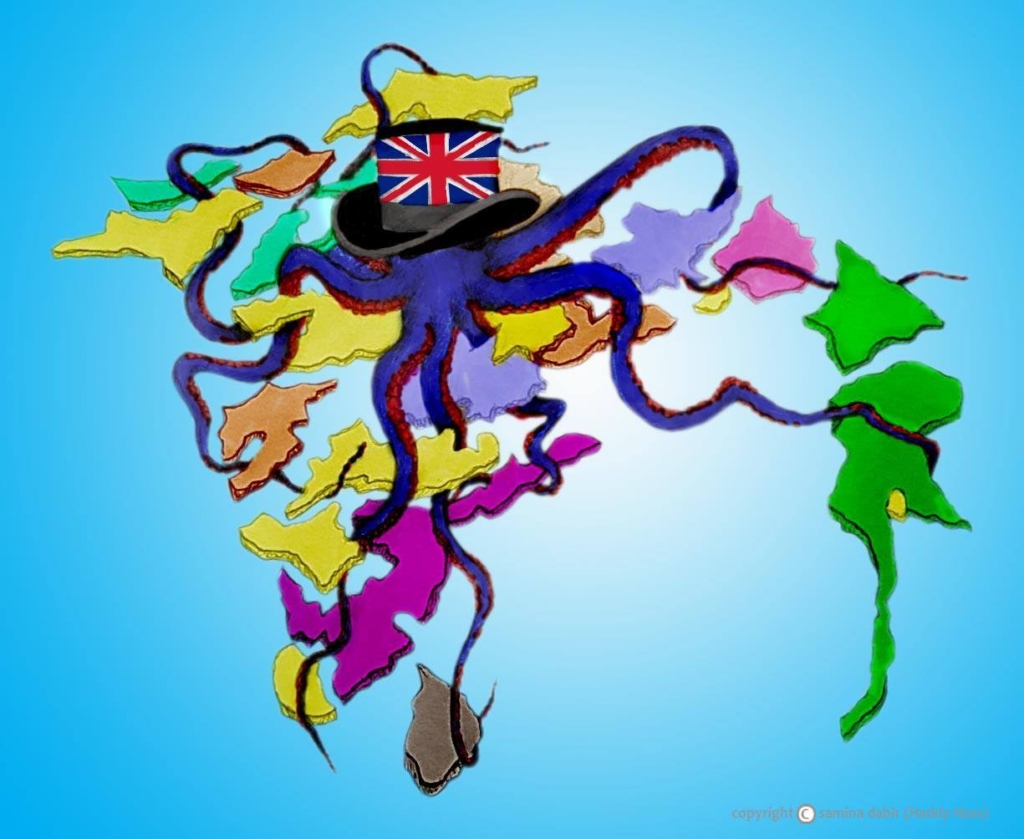‘…and the so-called one India is only a means
of British domination and British rule…’
Jinnah, Cairo, December 19, 1946
According to Jinnah, there never was any doubt that the British wanted to lead India ‘ultimately’ to freedom and independence, persistent with the ‘great ideal’ of Commonwealth (see his toast to King George VI). However, according to him, the British rulers tried to delay this goal as much as possible. With this purpose, they promoted the false idea that India was a single country, and introduced Western democracy.
The great Hindu visionary from Bengal, C. R. Das, had said at a public meeting at Barisal (present-day Bangladesh) in 1917:
Can you point your finger to any period of Indian history in which there was an united India? I have failed to discover it. Take the Magadh Empire—that great empire which was built up and which perished in course of time. That empire did not bring out Indian unity to the fullest extent. Take the Mahomedan Empire—it did not—it strove for that, and I fully appreciate that, that is the tendency of the Indian history from the earliest time to the present day.
Somebody asked, ‘In the time of Asoka?’ Das replied, ‘Even in the time of Asoka there was not one whole united India; it was the domination of one country over the rest of India.’
He was not the first to say that India had never been a single country, but he was possibly the first to say it on the ground that a country cannot be forged through conquest or subjugation, and must be formed with the free will of the constituent units.
Jinnah held the same view. When the Congress leader Rajagopalacharya criticized the demand for Pakistan by saying, ‘Indeed, not even Tippu Sultan or Hyder Ali or Aurangzeb or Akbar … imagined that India was anything but one and indivisible’; Jinnah’s reply was, ‘Yes, naturally they did so as conquerors and parental rulers. Is this the kind of government Mr. Rajagopalacharya does still envisage?’
Jinnah also went a step beyond and spelled out the logical conclusion of the argument:
The one thing which keeps the British in India is the false idea of a United India, as preached by Gandhi. A united India, I repeat, is a British creation – a myth, and a very dangerous myth, which will cause endless strife. As long as that strife exists, the British have an excuse for remaining. For once in a way, ‘divide and rule’ does not apply. (Interview in Verdict of India Beverley Nichols, p.193)
This claim was repeated by him clearly and emphatically over a number of years, e.g.:
- ‘United India means that so far as the people are concerned they have no voice and it is the rulers who will rule by manoeuvring. It is that system which the British government in India is following and desires to continue.’ (Bombay, 24 January 1943)
- ‘The British conception of the geographical unity of India is that British occupation and hold over India should continue indefinitely.’ (Aligarh, 9 March 1944)
- ‘The British aim at some system of Government by means of which they may remain on the top. We know that this United India can never be free, although many young men are easily allured by the picture of a United India, having a national government of its own. It’s an impossibility.’ (Lahore, 31 March, 1944)
- ‘In their secret dispatches, statements and documents they [fusion_builder_container hundred_percent=”yes” overflow=”visible”][fusion_builder_row][fusion_builder_column type=”1_1″ background_position=”left top” background_color=”” border_size=”” border_color=”” border_style=”solid” spacing=”yes” background_image=”” background_repeat=”no-repeat” padding=”” margin_top=”0px” margin_bottom=”0px” class=”” id=”” animation_type=”” animation_speed=”0.3″ animation_direction=”left” hide_on_mobile=”no” center_content=”no” min_height=”none”][i.e. the British] have made it clear since India Bill was introduced [in 1858] and when the Crown assumed the Government of India, that when they say United India, they mean perpetuation [of] British Imperialist domination. They have kept us on that line for nearly a century.’ (Bombay, 14 October 1944)
- ‘British statesmen … put up the plea of a united India because they knew that it is the only way by means of which they can prolong and continue their lordship over the entire subcontinent of India.’ (Ahmedabad, 15 January 1945)
- ‘… and the so-called one India is only a means of British domination and British rule that preaches the maintaining of peace and social order.’ (Cairo, 19 December 1946)
- ‘Let me tell you who brought this idea into our head. It is the British. What does it matter to Britain if India is divided or not divided? Why should the British bother? Why are they encouraging hopes against hopes [of a united India] and offer a few passages for the leadership of the country? Britain is going, it has to go away. But why should they go about talking of a united India? Because they know it better than Indians do. Therein lies their [British] salvation. Because so long as it is insisted that India is one, they know that there will be nothing but destruction and bloodshed. This has been the idea of Britain and while leaving the country the British are inspiring the armed camp.’ (Bombay, 27 March 1947)
- ‘Indeed, if you ask me this has been the biggest hindrance in the way of India to attain the freedom and independence and but for this we would have been free peoples long long ago.’ (Karachi, 11 August 1947 – the famous speech in the constituent assembly of Pakistan)
This idea was obviously not favoured by that group of self-seeking bureaucrats who eventually usurped power in the country founded by him, and dissolved the constituent assembly in October 1954. Muhammad Munir, the Chief Justice of Pakistan, gave a long-winded ruling in their favour in May 1955. The ruling was based on the plea that the British Crown had not transferred sovereignty to Pakistan in 1947. Therefore, the norms of territories ‘settled or ceded or conquered’ were still applicable in the land.
Thus it was denied that ‘agreed consent’ is the basis of all government – the principle that had supported Jinnah’s argument that India had never been a country in the past.
In The Struggle for Pakistan, first published in 1967, Dr Ishtiaq Husain Qureshi followed the premise that India, ‘with minor exceptions’, had been brought under a central rule by the Muslim rulers, and ‘Thus Europeans and Indians themselves got used to the idea of India being in fact or potentially a single political unit.’ [p.2]
The readers were not informed that this premise is a negation of the Pakistan Resolution. As already mentioned, the Congress leader Rajagopalacharya had said, ‘Indeed, not even Tippu Sultan or Hyder Ali or Aurangzeb or Akbar … imagined that India was anything but one and indivisible.’ Jinnah had replied, ‘Yes, naturally they did so as conquerors and parental rulers. Is this the kind of government Mr. Rajagopalacharya does still envisage?’
The argument presented by Rajagopalacharya against Pakistan, refuted by Jinnah so vehemently, has thus been the premise of The Struggle for Pakistan. It has also been perpetuated through the four volumes of A Short History of Pakistan. Both works are widely used as standard references in public universities in Pakistan.
Consequently, we have come to believe that India was a single country in which the Hindus and the Muslims were two separate nations. This, in fact was the point of view of the Hindu Mahasabha, the self-proclaimed enemy of Islam.
Jinnah’s point of view, as already seen, was that India was not a single country, and the Hindus and the Muslims were two nations with majorities in different countries; it was therefore unfair to combine those countries without consent.
The Urdu book Pakistan Naguzeer Thha [Pakistan Was Inevitable] by Syed Hasan Riaz (1967 / 1970) is a treasure-trove of rare insights from a veteran of the Pakistan Movement, but on the specific issue of the One-India fallacy, this otherwise valuable book is quite similar to the books produced by Qureshi.
Jinnah of Pakistan by the American author Stanley Wolpert, first published in 1984, is often treated as gospel on the subject. Regarding the memorable speech delivered by Jinnah in Pakistan’s constituent assembly on 11 August 1947, the author starts with some factual mistakes, which can be skipped for now, as they are not directly relevant to the present topic. Then he quotes Jinnah to the effect that the strife between the Hindus and the Muslims had been ‘the biggest hindrance in the way of India to attain freedom and independence…’ Quoting these lines, the author interjects with the following unfounded comment on p.338:
What a remarkable reversal it was, as though he had been transformed overnight once again into the old ‘Ambassador of Hindu-Muslim Unity’ that Sarojini Naidu loved.
In truth, this was no reversal at all. Jinnah had repeatedly explained that even in the days when he was called ‘Ambassador of Hindu-Muslim Unity’, he had believed that the Muslims were a separate entity.
Wolpert also does not mention (though it is evident from the transcript of the session) that Jinnah was giving a rebuttal to a member of the Congress party, who had said just a few moments earlier, ‘Frankly, Sir, we are not very happy. We are unhappy because of this division of India.’ In reply, Jinnah could have only reaffirmed his long-held stance, well-known at the time, that the fallacy of one India itself was the cause of the strife between the Hindus and the Muslims, ‘and but for this we would have been free peoples long long ago’.
Wolpert has completely reversed the meaning with the aid of a sentimental screenplay.
In 1985 was published The Sole Spokesman: Jinnah, the Muslim League and the demand for Pakistan by Ayesha Jalal. It is seen as a highly influential academic work. Unlike the other authors discussed here, who did not say that they were presenting Jinnah’s own point of view, Jalal sets out with this specific claim in the ‘Introduction’ (p.5):
The Congress, whether its manoeuvrings at the centre or its politics in the provinces, will be seen primarily from Jinnah’s angle of vision … British policies and initiatives … will also be viewed from the perspective of Jinnah and the League.
In spite of this claim, she fails to mention in that entire book – 310 pages – Jinnah’s argument that the idea of one India was a means of British domination and British rule.
Nor is this mentioned in The Indus Saga and the Making of Pakistan by Aitzaz Ahsan, which came out in 1996, and which has also gone through several editions.
Thus the sources upon which we have relied most frequently for information about Jinnah and the making of Pakistan did not only fail to mention his first basic argument, but often replaced it with something else.
This is a modified version of the first chapter of Jinnah: The Case for Pakistan. Complete references for the facts and quotations cited here can be found in the printed book. Download PDF or find out how to purchase a hard copy.
Jinnah: The Case for Pakistan | Chapter 2: Malignant Democracy | Chapter 3: Mortal Empire, Immortal League | Chapter 4: Aristocratic Radicalism | Chapter 5: New Destinies
[/fusion_builder_column][/fusion_builder_row][/fusion_builder_container]

